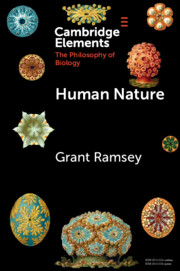Refine search
Actions for selected content:
59 results
Chapter 7 - Parts and Wholes in the Parts of Animals
-
-
- Book:
- Aristotle's <i>Parts of Animals</i>
- Published online:
- 31 December 2025
- Print publication:
- 19 February 2026, pp 152-173
-
- Chapter
- Export citation
Chapter 5 - Hylomorphism in the De Partibus Animalium
-
-
- Book:
- Aristotle's <i>Parts of Animals</i>
- Published online:
- 31 December 2025
- Print publication:
- 19 February 2026, pp 111-133
-
- Chapter
- Export citation
Chapter 2 - Kant’s Hylomorphism and the Thing-in-Itself
-
-
- Book:
- The Aristotelian Kant
- Published online:
- 15 December 2025
- Print publication:
- 22 January 2026, pp 35-64
-
- Chapter
- Export citation
7 - The Trinity
- from Part II - Theological Themes
-
-
- Book:
- The Origins of Scholasticism
- Published online:
- 18 November 2025
- Print publication:
- 08 January 2026, pp 208-236
-
- Chapter
- Export citation
Chapter 7 - Modality
- from Part I - Method, Metaphysics, and Epistemology
-
- Book:
- The Philosophy of Antoine Arnauld
- Published online:
- 27 November 2025
- Print publication:
- 11 December 2025, pp 142-164
-
- Chapter
- Export citation
HIGHER-ORDER ESSENCES: LOGIC AND SEMANTICS
- Part of
-
- Journal:
- The Review of Symbolic Logic , First View
- Published online by Cambridge University Press:
- 13 November 2025, pp. 1-42
-
- Article
-
- You have access
- Open access
- HTML
- Export citation
No association between joint hypermobility, musculoskeletal pain and neurodevelopmental problems in a school-based sample of 11-year-old children
-
- Journal:
- BJPsych Open / Volume 11 / Issue 6 / November 2025
- Published online by Cambridge University Press:
- 03 November 2025, e262
-
- Article
-
- You have access
- Open access
- HTML
- Export citation
What could it mean to say that sex is eternal?
-
- Journal:
- Religious Studies , First View
- Published online by Cambridge University Press:
- 06 August 2025, pp. 1-14
-
- Article
-
- You have access
- Open access
- HTML
- Export citation
Aquinas on the Necessity of Natures: The Logical Limits of Divine Omnipotence
-
- Journal:
- New Blackfriars / Volume 106 / Issue 4 / July 2025
- Published online by Cambridge University Press:
- 15 May 2025, pp. 271-285
- Print publication:
- July 2025
-
- Article
- Export citation
6 - Worship as Real Union
- from Part II - What Is Worship?
-
-
- Book:
- The Philosophy of Worship
- Published online:
- 09 January 2025
- Print publication:
- 23 January 2025, pp 93-116
-
- Chapter
- Export citation
15 - The Individual’s Relationship with God
- from Part IV - Forms and Functions of Worship
-
-
- Book:
- The Philosophy of Worship
- Published online:
- 09 January 2025
- Print publication:
- 23 January 2025, pp 278-295
-
- Chapter
- Export citation
Does the Orthodox tradition have anything to contribute to analytic theology?
-
- Journal:
- Religious Studies / Volume 61 / Issue 2 / June 2025
- Published online by Cambridge University Press:
- 18 December 2024, pp. 334-349
-
- Article
- Export citation
Chapter 10 - The Despair of Judge William
-
-
- Book:
- Kierkegaard's <i>Either/Or</i>
- Published online:
- 16 November 2023
- Print publication:
- 30 November 2023, pp 171-187
-
- Chapter
- Export citation
4 - Aquinas’s Account of Creation
-
- Book:
- Theistic Evolution
- Published online:
- 19 October 2023
- Print publication:
- 02 November 2023, pp 127-155
-
- Chapter
- Export citation
7 - Concurrence of Divine and Created Causes in Evolutionary Transitions
-
- Book:
- Theistic Evolution
- Published online:
- 19 October 2023
- Print publication:
- 02 November 2023, pp 201-221
-
- Chapter
- Export citation
Aquinas on The Distinction Between Esse and Esse: How the Name ‘Esse’ Can Signify Essence
-
- Journal:
- New Blackfriars / Volume 104 / Issue 1114 / November 2023
- Published online by Cambridge University Press:
- 01 January 2024, pp. 628-650
- Print publication:
- November 2023
-
- Article
- Export citation
4 - Identity, Self, and Personhood
-
- Book:
- An Introduction to Mesoamerican Philosophy
- Published online:
- 28 July 2023
- Print publication:
- 03 August 2023, pp 114-138
-
- Chapter
- Export citation

Human Nature
-
- Published online:
- 12 July 2023
- Print publication:
- 10 August 2023
-
- Element
-
- You have access
- Open access
- HTML
- Export citation
Chapter 5 - Solving the Conjunctive Problem of Happiness
-
- Book:
- Aristotle on Happiness, Virtue, and Wisdom
- Published online:
- 15 June 2023
- Print publication:
- 29 June 2023, pp 109-134
-
- Chapter
- Export citation
Metaphysically Opaque Grounding
-
- Journal:
- Canadian Journal of Philosophy / Volume 52 / Issue 7 / October 2022
- Published online by Cambridge University Press:
- 24 April 2023, pp. 729-745
-
- Article
-
- You have access
- Open access
- HTML
- Export citation
